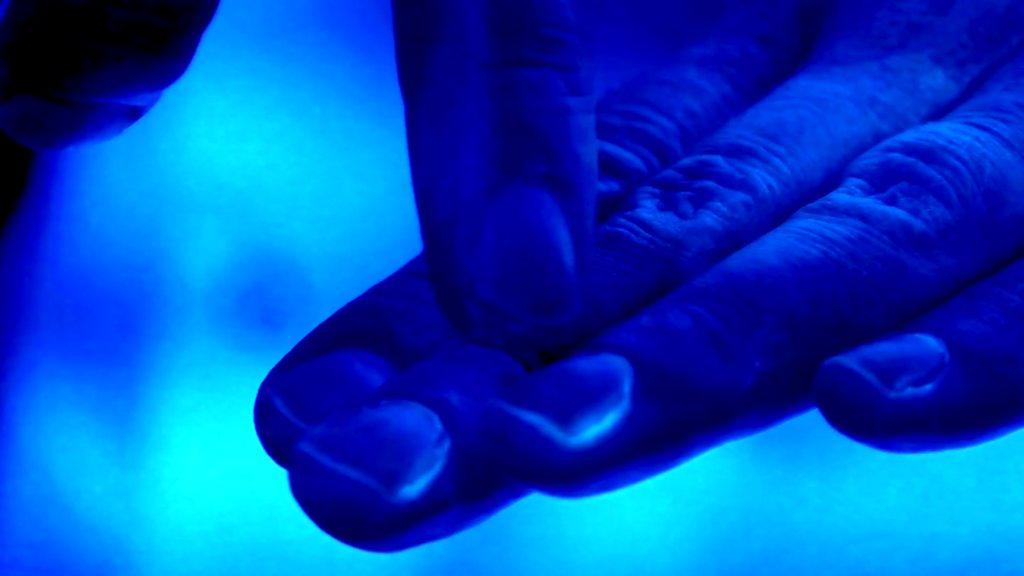Tedros Adhanom Ghebreyesus: The Ethiopian at the heart of the coronavirus fight
- Published
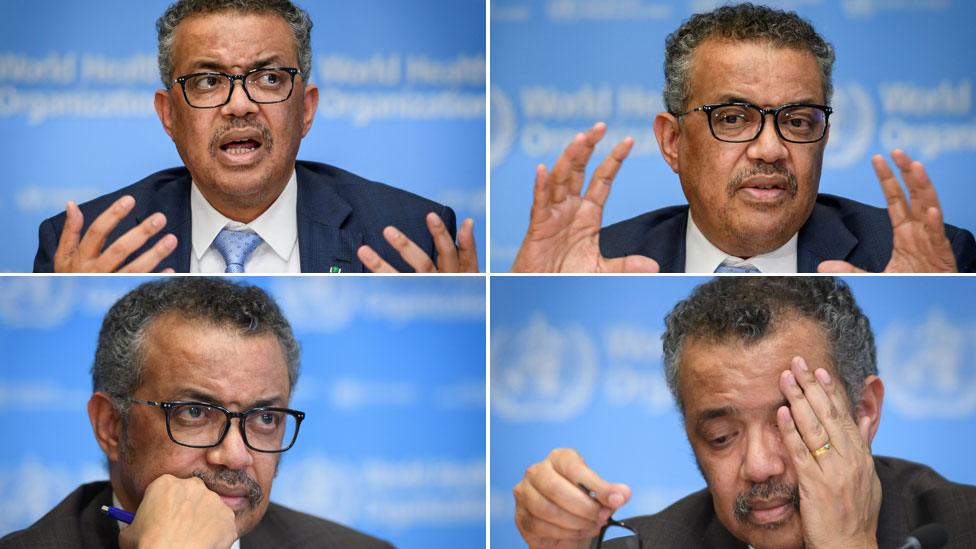
Dr Tedros Adhanom Ghebreyesus, head of the World Health Organization (WHO), is something of a superstar these days.
The entire planet hangs on his every word as he explains, during regular press conferences at WHO headquarters in Geneva, just how widespread the Covid-19 pandemic now is and what countries must do to defeat it.
A who's who of world leaders joined him, virtually, at one of those meetings last month - France's President Emmanuel Macron, Germany's Chancellor Angela Merkel, and South Africa's President Cyril Ramaphosa - all pledging support for the WHO's efforts to end the pandemic, and find a vaccine.
Pop star Lady Gaga turned up a week before that, announcing an online music festival One World Together at Home - with a host of big names from Billy Eilish, to Elton John, to the Rolling Stones.
No other senior UN official, not even the UN Secretary General himself, has ever received so much attention.
Very determined man
Dr Tedros, as he likes to be known, is the first African head of the WHO.
He took office two-and-a-half years ago promising to reform the organisation, and to tackle the illnesses that kill millions each year: malaria, measles, childhood pneumonia, and HIV/Aids.
A certain political wiliness has become apparent too as Dr Tedros faces down more than just the virus itself.
He has weathered bitter criticism - most notably from the US - of his handling of the pandemic, which the WHO declared a Public Health Emergency of International Concern (PHEIC) on 30 January.
A PHEIC is the WHO's highest level of health emergency. That means it requires 24-hour monitoring, deployment of medical staff, equipment and medicines, daily discussions with affected countries and countries who might be affected, and of course, a steady stream of reliable information for an anxious world desperate for immediate answers.
A huge task for the "charming" and "unassuming" 55-year-old at the organisation's head.
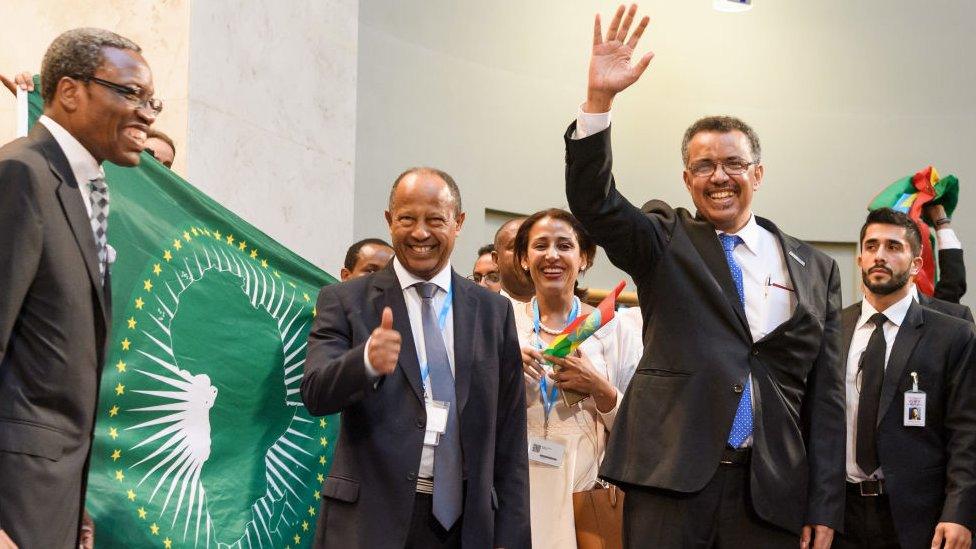
In 2017, Dr Tedros became the first African to lead the WHO
At his first press conference as WHO director general, the Geneva-based journalists quickly realised Dr Tedros' style would be very different.
He strolled in smiling, sat down and chatted in a very relaxed way, his voice sometimes so quiet it was difficult to hear him. That was a very big change from his more formal predecessor, Margaret Chan.
And yet, behind that quiet manner, there lies a very determined man.
Before becoming head of the WHO, he climbed through the ranks of Ethiopia's government, becoming health minister and then foreign minister. He could not have risen that far by being self-effacing.
How brother's tragic death motivated him
Dr Tedros was born in 1965 in Asmara, which became Eritrea's capital after independence from Ethiopia in 1991, and grew up in northern Ethiopia's Tigray region.
One formative, and now motivating experience, was the death of a younger brother, who was around four years old at the time, he told Time magazine in November, external. Later, as a student, Dr Tedros came to suspect it was measles that killed him.
"I didn't accept it; I don't accept it even now," he was quoted as saying, adding that it was unfair that a child should die from a preventable disease just because he was born in the wrong place.
"All roads should lead to universal health coverage. I will not rest until we have met this," he told the World Health Assembly shortly before his election as WHO chief.
As the coronavirus pandemic exposes the fragility of even the richest countries' health sectors in a crisis, Dr Tedros and his supporters believe it's the best argument there is for a radical global commitment to universal health coverage.
Tedros Adhanom Ghebreyesus
Bornin Asmara in 1965
Completed PhDin community health in 2000
Health minister2005-2012
Foreign minister 2012-2016
ElectedWHO director general in 2017

Dr Tedros became a member of the Tigray People's Liberation Front (TPLF), which was in the vanguard of the 1991 overthrow of Ethiopia's Marxist dictator, Mengistu Haile Mariam.
As a government minister from 2005, he was seen as more approachable and friendly than some of his more austere TPLF comrades.
He has been praised for reforming the health sector and improving access to health care in Ethiopia, Africa's most populous state after Nigeria.
But when he was in charge, his ministry was known to discourage journalists from reporting about suspected cholera cases in the country.
'Coaxing China to transparency'
During his highly efficient and ultimately successful campaign to lead the WHO, Dr Tedros' supporters dismissed allegations that he had covered up cholera outbreaks.
That is why "persuasive" and "political" are also words which crop up regularly when discussing his leadership of the WHO.
He knows that the WHO's success tackling global health crises depends on the co-operation of the organisation's 194 member states.
Coronavirus vaccine: How close are you to getting one?
During the current Ebola outbreak in DR Congo which is also a PHEIC, he has travelled there several times, not just to see the situation but to also talk to government leaders. And he moved quickly to visit Beijing when news of the coronavirus outbreak emerged.
"His strategy is to coax China to transparency and international co-operation rather than criticising the government," says Lawrence Gostin, Professor of Global Health Law at Georgetown University.
But has that actually worked?
Some WHO watchers have criticised the effusive praise heaped on China for its containment measures.
Criticised by Trump
After his trip to Beijing, Dr Tedros said China had set "a new standard for outbreak control".
A few days later, he told world leaders meeting at the Munich Security Conference that China's actions had "bought the world time".
Such comments sit uneasily with the knowledge that China arrested health workers who first raised the alarm about the outbreak.
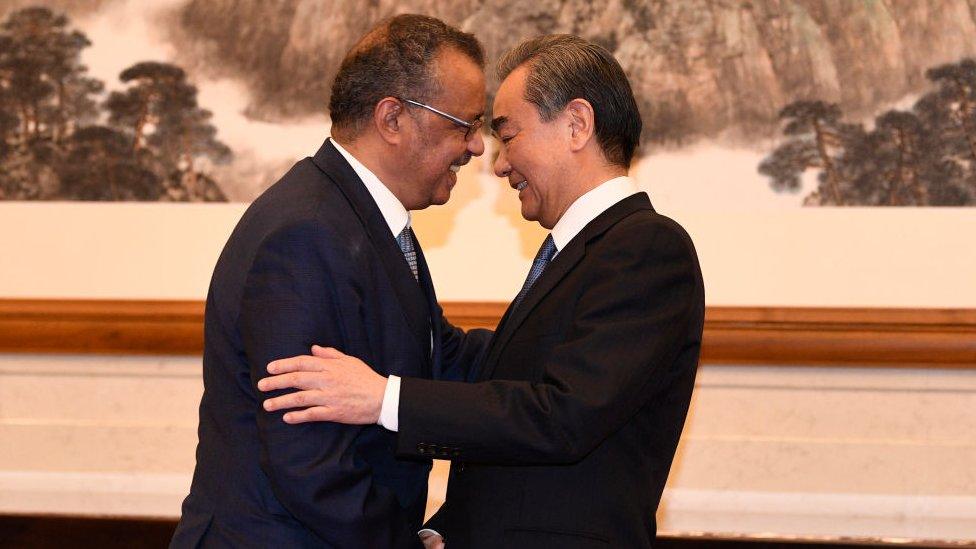
Dr Tedros went to China at the end of January shortly before declaring the new coronavirus as a global emergency
The US, with President Donald Trump leading the way, has cut its funding to the WHO, saying the organisation botched its efforts to control the pandemic.
Dr Tedros knows very well just how serious the US funding cut is, not just on an immediate financial level, but to the whole UN system, based as it is on a multilateral approach to the world's biggest threats.
He has been careful to say that he "regrets" the US decision, and his only mention of Mr Trump was to say he thought the president was handling the US' virus outbreak well.
But that all-star line up of world leaders, in which the US was conspicuous by its absence, was a political masterstroke.
It laid the groundwork for an accelerated development of treatments and vaccines, and promised the resulting medicines would be fairly priced, and available to all.
At the same time it sent a signal to Washington: Look, we're all here getting on with this crisis together, where are you?
Dither and delay?
So is there any foundation to the US charge that the WHO waited too long to declare a PHEIC?
"I was one of the first to ask him to call a PHEIC," says Prof Gostin. "Having said that, it was only a short delay and I don't think the timing had any impact on the trajectory of Covid-19."
"I do worry quite a bit however that his effusive praise for China could in the long term tarnish the WHO's reputation as a trusted scientific authority willing to speak truth to power."

A SIMPLE GUIDE: How do I protect myself?
AFRICA TRACKER: Updates on the continent's cases
FACE MASKS: Should I be wearing one?
VACCINE: How close are we to finding one?
LOCKDOWNS: The different approaches in Africa

Meg Davis, a global health specialist at Geneva's Graduate Institute, views the WHO's position as an awkward one.
"All my sympathies go to [them], they were in a tough spot," she says. "China was the place where we first saw the outbreak. They [WHO] sent a team to China, wrote generally an accurate report about the things China was doing well.
"But they didn't talk about censorship, or repression of whistleblowers… and because they didn't do that, they are now having to pay a ridiculous price."
Now is not the time, says Dr Davis, to start cutting funding.
"At this moment we really need the WHO more than ever. We need a functional well-resourced organisation, to analyse the data and gather evidence of what works."
So while Dr Tedros may be political, a lot of that political effort seems to be spent reassuring authoritarian, opaque governments, in a bid to get them to work with the WHO to tackle diseases which threaten global health.
When it comes to perceiving how that effort may be viewed by governments in Western democracies, his political skills may not be quite so sharp.
Shortly after taking office he proposed Robert Mugabe, Zimbabwe's president at the time, as a WHO goodwill ambassador, saying he had worked to make Zimbabwe "a country that places universal health coverage and health promotion at the centre of its policies".
Only after days of outrage, not just from governments, but from human rights groups, who pointed to the deprivation that Mr Mugabe's regime had inflicted on its people, did Dr Tedros decide to withdraw his proposal.
'Pitiful funding for WHO'
It is not the first time the WHO has been in the spotlight for allegedly handling a disease outbreak badly.
Dr Tedros' predecessor Margaret Chan was criticised for a perceived overreaction to the 2010 swine flu outbreak, over which she declared a pandemic and advised countries to spend millions on medicines most did not, in the end, need.
Watch how germs spread and how you can prevent it
Then she was seen to react far too slowly to West Africa's catastrophic Ebola outbreak, which claimed at least 11,000 lives.
"Damned if you do, damned if you don't," is a phrase you often hear at WHO headquarters.
Prof Gostin believes Dr Tedros has become "the symbol of leadership" in the course of the coronavirus crisis. But, he warns, the WHO's "fundamental weaknesses are still there, including pitiful funding".
'My focus is on saving lives'
The success of Dr Tedros, and the WHO as a whole, at handling the coronavirus will not be really clear until the crisis is over.
For now, he will keep on advising countries to prepare, to diagnose, to trace, and to contain.
And so he continues with his press conferences. He knows they are being watched around the world, in every time zone. He begins each with the words "Good morning, good afternoon, and good evening".
Despite the pressure to come up with answers, and despite the constant media spotlight, he remains quiet and friendly.
His only flash of passion came when he was asked, for the umpteenth time, what his response was to the personal criticism of him.
"I don't have extra energy for that," he said. "My focus is on saving lives."
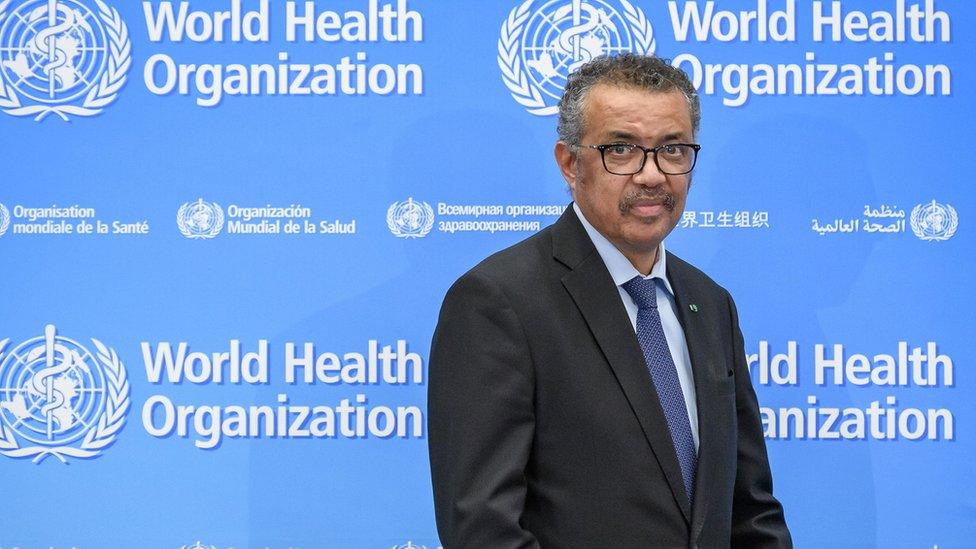
- Published3 March 2020
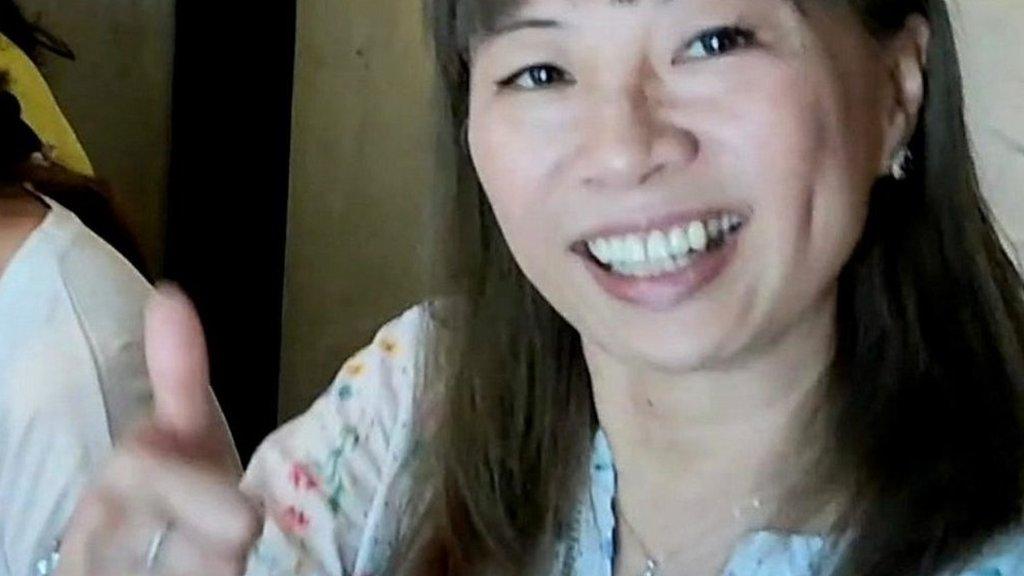
- Published2 March 2020
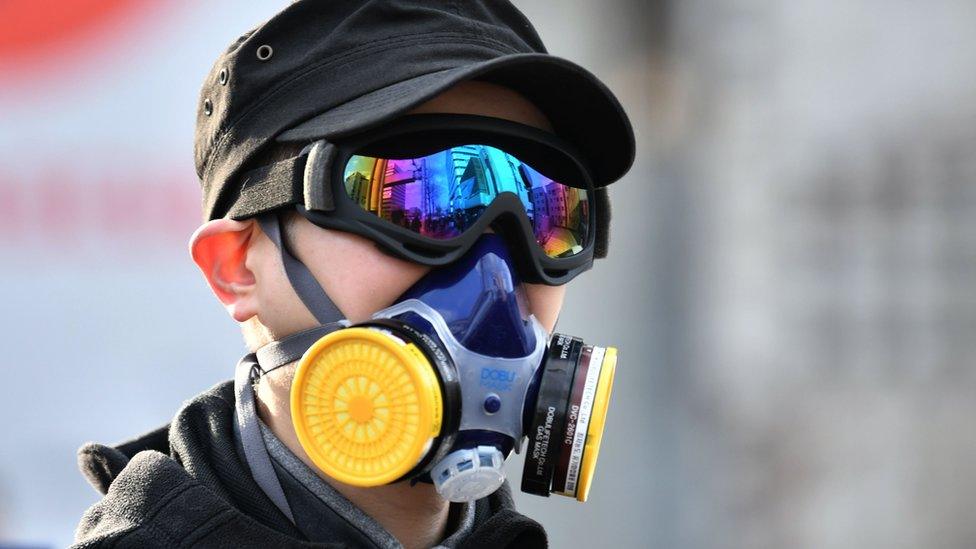
- Published28 February 2020
